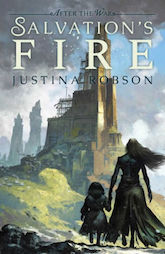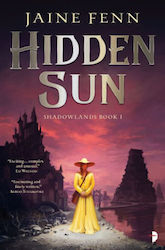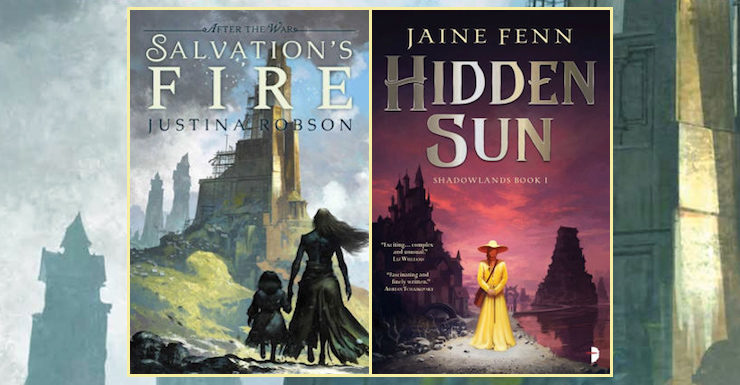There’s an enormous amount of interesting new SFF literature out practically daily. I read fast, but you know, it’s impossible to keep even close to completely current with the fresh new delights (and, occasionally, horrors) this field has to offer.
But! Justina Robson has written the second book in the “After the War” series, following Adrian Tchaikovsky’s excellent Redemption’s Blade. Salvation’s Fire is just as entertaining, albeit with a slightly different focus.
Buy the Book


Salvation’s Fire
The background: a great war started by the Kinslayer, a demigod-turned-evil-tyrant, has devastated the inhabited world. The war’s over and the Kinslayer’s dead, but the consequences go on: the Kinslayer cut the world off from the gods and punched holes into different dimensions in search of even more power, and a small band of unlikely comrades are drawn together to clean up some of the mess.
Salvation’s Fire, like Redemption’s Blade, combines the tone of sword-and-sorcery with the scale and scope of epic fantasy. It’s concerned with interrogating the aftermath of great struggles against Dark Forces—and with the nature of people, and the choices they make. Celestaine, one of the slayers of the Kinslayer, her lover Heno (once one of the Kinslayer’s own shock troops), their companion Nedlam (also once one of the Kinslayer’s shock troops), and Ralas, a bard caught between life and death due to the Kinslayer’s inventive tortures, encounter Kula, a child survivor of the massacre of her people—last of a heretic sect of the Tzarkomen necromancers—and Lysandra, a woman created by Tzarkomen necromancy and the sacrifice of thousands of women and girls to be the Kinslayer’s Bride. Lysandra’s power is immense, godlike, but so is her initial naivety. She and Kula bond, for Kula is the one to wake her into life.
This group—complicated by the addition of Guardians (for which read “demigods”) with competing priorities, a young merchant by the name of Bukham, and the interfering pair of artefact-collectors, Doctors Catt and Fisher—is off to save the world again. No one will thank them for it.
Robson writes a tense, fast-paced quest adventure. The characters are deeply compelling, especially the not-quite-a-Guardian Tricky, who served the Kinslayer while at the same time working for his eventual defeat, and who has painful, conflicted feelings about her complicity and responsibility. I really enjoyed this novel—it manages to be surprising. I hope to see more like it.
Jaine Fenn’s Hidden Sun is her first novel in five years, and her first fantasy novel. For certain values of fantasy: it’s entirely possible, and indeed the narrative renders it probable, that this is low-tech science fiction, set on another world where the human inhabitants have forgotten the technology that they once possessed.
Buy the Book


Hidden Sun
Fenn’s physical worldbuilding is fascinating, depicting a world divided between the skylands, where the sun burns dangerously hot and most of the flora and fauna are dangerous to unmodified humans, and the shadowlands, where the sun doesn’t shine (though there is still some light) and agriculture is possible. The skykin can dwell in the skylands, but only because they bond with a symbiote—the animus—that causes their bodies to change and that gives them the memories of people who previously bonded with that animus, but their unbonded children are raised in crèches in the shadowlands.
Hidden Sun follows two main characters, shadowlands noblewoman Rhia Harlyn and outcast skykin youth Dej. Rhia’s a natural philosopher, a scientist—an “enquirer” as her society terms them—in a society that frowns both on women’s intellect and on scientific inquiry. Dej is a small bundle of resentful misery looking for a place to belong.
Rhia’s brother, Etyan, left the city in the wake of an unsolved murder, and when the city’s ruler informs Rhia that Etyan’s been located, Rhia insists on joining the small team of city militiamen sent across the skylands to the neighbouring shadowland to bring him home. (She’s always wanted to see the world, take notes on it, and figure out how things work.) Rhia’s path crosses with Dej’s in the wake of retrieving Etyan, because bringing him home is rather more complicated than she anticipated: a religious leader and scientist by the name of Sadakh has used Etyan as an experimental subject, and Sadakh wants Etyan back. Dej, part of a group of outcasts employed to kidnap Etyan back into Sadakh’s control, has to choose where her loyalties lie.
Although I didn’t love that this novel’s one queer crush ended in death, this is an entertaining story with fascinating worldbuilding. The pacing is a little uneven, and the balance of emphasis between politics, Rhia’s scientific inquiries, and Dej’s life, feels askew. I’m looking forward to seeing what the sequel, Broken Shadows (due April 2019) does with all of Hidden Sun’s hints and intrigues.
What are you guys reading lately?
Liz Bourke is a cranky queer person who reads books. She holds a Ph.D in Classics from Trinity College, Dublin. Her first book, Sleeping With Monsters, a collection of reviews and criticism, was published in 2017 by Aqueduct Press. It was a finalist for the 2018 Locus Awards and was nominated for a 2018 Hugo Award in Best Related Work. Find her at her blog, where she’s been known to talk about even more books thanks to her Patreon supporters. Or find her at her Twitter. She supports the work of the Irish Refugee Council, the Transgender Equality Network Ireland, and the Abortion Rights Campaign.










